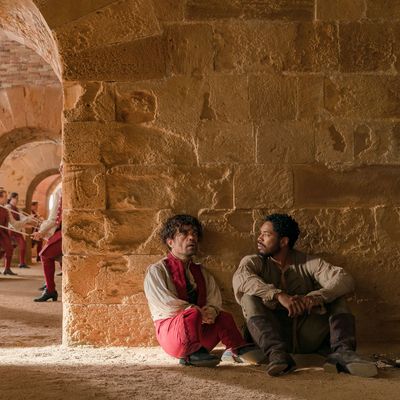
Cyrano is, technically speaking, Joe Wright’s first musical film, but you could say he’s been making musicals his entire career. Think back to the tribal-ritual-style dances of Pride and Prejudice; to the tireless, techno-inflected action scenes of Hanna; to the grand, balletic gestures and click-clack tempos of Anna Karenina. Even his Churchill-at-war drama The Darkest Hour has a ferocious, developing rhythm to it; the much-discussed scene in which Gary Oldman’s Winston Churchill finds himself chatting up ordinary citizens on the London Underground is shot and cut like a show-stopping musical number, just without any singing.
And so, as Cyrano begins, you sense a director fully in his element, able to weave in and out of bursts of song and snatches of dancerly movement without ever fully disappearing into the realm of the unreal. The movie sings even when nobody’s singing: Characters speak as if guided by internal meters, and they move with brisk, purposeful precision. As a result, when they do burst into song and dance, it feels organic and natural, like everything’s just tipped one slight degree into the fantastical. Cyrano is a delicate dream of a movie, the kind of film that feels like you might have merely imagined it — light on the surface but long on subconscious impact.
This is, of course, an adaptation of Edmond Rostand’s classic 1897 play Cyrano de Bergerac, but the central conceit comes from Erica Schmidt’s 2018 stage musical Cyrano, written for her husband, Peter Dinklage. As the title character, Dinklage does not don the traditional huge fake nose; Cyrano’s inability to accept himself as an object of romantic love comes from his stature. It’s a simple but startling change — without that comical, surreal grace note of the nose, Cyrano immediately becomes a rawer, more relatable figure.
That goes perfectly with the picture’s practically anti-Broadway soundtrack of love songs by the National, with their galloping rhythms and breathless lyrics and unfiltered emotions. Cyrano is one of the most romantic movies ever made, but it’s not quite a traditional love story in that nobody really finds true love in it. It’s all evasion, heartache, yearning. This is the romance of hidden thoughts and desires, of urges barely spoken (but often unabashedly sung), of a sweet pain we all secretly remember. It’ll take you right back to high school and college and all those other places where you had your heart shattered into a million pieces.
For Dinklage, losing the nose also accomplishes something more practical. He might be one of the most purely expressive actors of his generation, and his eyes and mouth and facial muscles do so much more without a giant phony proboscis to navigate around. In one early scene, Cyrano’s beloved Roxanne (Haley Bennett) coyly confides to him about someone she’s fallen for. The moment comes straight out of Rostand, and it’s always been one of the work’s high points. But the range of emotions Dinklage runs through in just a few seconds is bewildering. Cyrano’s face goes from cautious enthusiasm to giddy delight to astonishing heartbreak, as he briefly believes Roxanne is talking about him.
But no, she’s talking about Christian de Neuvillette (Kelvin Harrison Jr.), a handsome new arrival in town and a fellow guardsman in Cyrano’s regiment. Roxanne falls for him the moment she spies him across a crowded theater, and he for her. Rostand’s Christian was rather dim, and the character has been a memorably comic one over the years. (The great ’80s hunk Rick Rossovich had a grand old time playing him in the modern-day adaptation Roxanne, alongside Steve Martin.) In Schmidt and Wright’s version, Christian is beautiful, fresh-faced, kind — but hopelessly inarticulate when it comes to flowery prose and wooing. Together, he and Cyrano make a compelling but unlikely pair: the poet and the soldier, the cynic and the innocent.
But this tale is not one of mere duplicity, of an embittered romantic writing letters to the unattainable beauty he secretly loves on behalf of a trusting hunk. Christian and Cyrano complete each other, and Roxanne essentially, tragically, wants them both. And Wright goes there. In one of the film’s several high points (during the song “Every Letter”) Cyrano-slash-Christian’s messages become sensuous objects, vessels for a spiritual threesome among the central characters, as Roxanne gently rubs the pieces of paper all over her body. The camera even makes sure to focus on the liquid qualities of ink on paper. Prurient, perhaps, but also just an incredibly seductive piece of cinema. The film woos us the way the two men try to woo Roxanne.
There’s an unabashed freedom to Cyrano that’s breathtaking, a fearlessness in the face of love — in contrast, perhaps, to the main hero’s submerged longings. It doesn’t stop there, however. Love in all its forms eventually comes into play. A climactic battle, shot on the side of a volcano, is prefaced by a devastating song (“Heaven Is Wherever I Fall”) in which various doomed soldiers write letters home to their loved ones — to a wife, a parent, an unrequited paramour. It’s a rather stunning emotional turn for the film to take, but in retrospect, it’s also a beautiful one. Because Cyrano, in the end, gives us an experience that goes from the carnal to the spiritual, suggesting that when we love somebody, whoever it might be and whoever we might be and whatever the nature of our love, we become a part of something greater. I can think of no idea more essential.
More Movie Reviews
- The Accountant 2 Can Not Be Taken Seriously
- Another Simple Favor Is So Fun, Until It Gets So Dumb
- Errol Morris Has Been Sucked Into the Gaping Maw of True Crime


